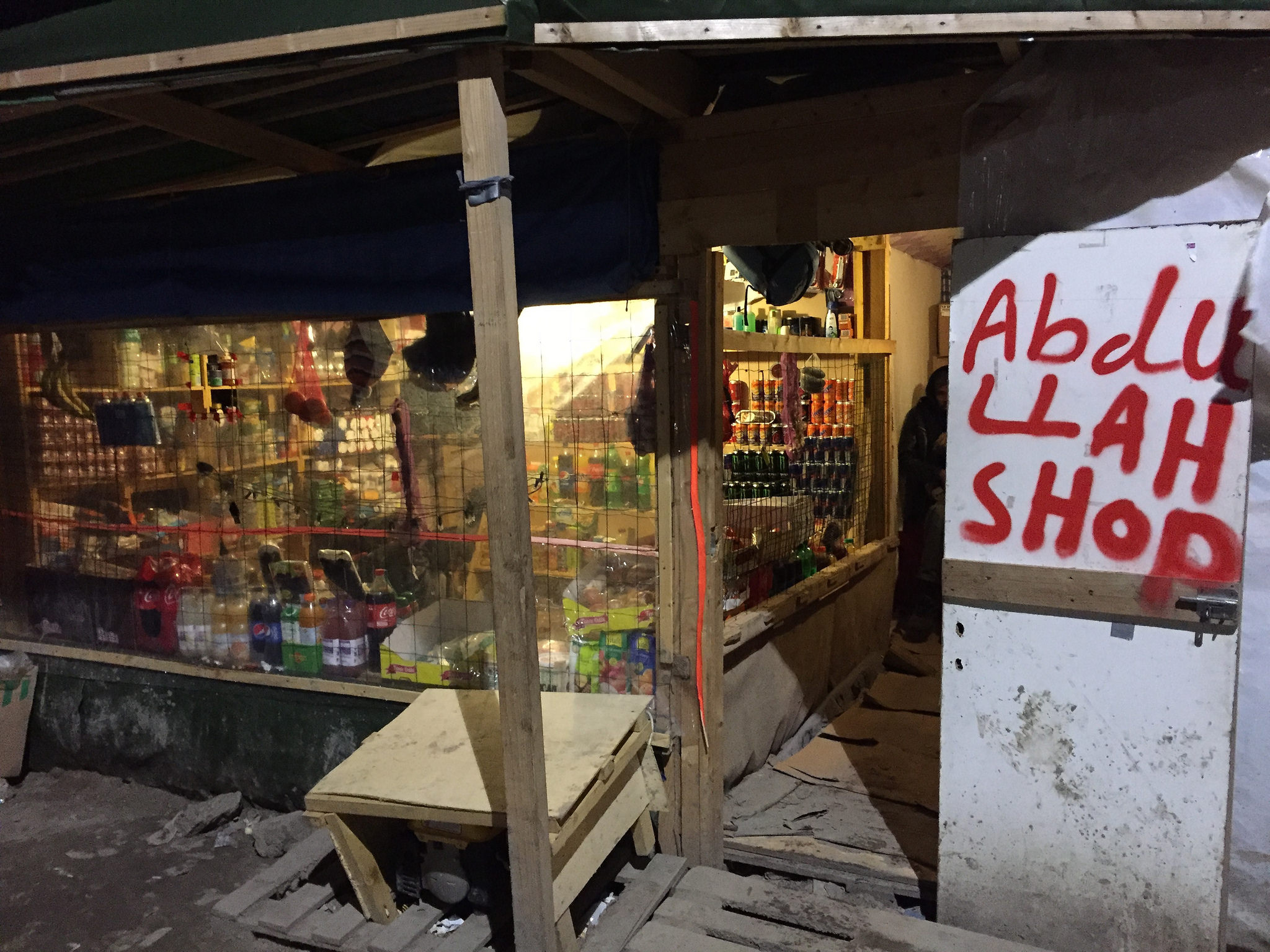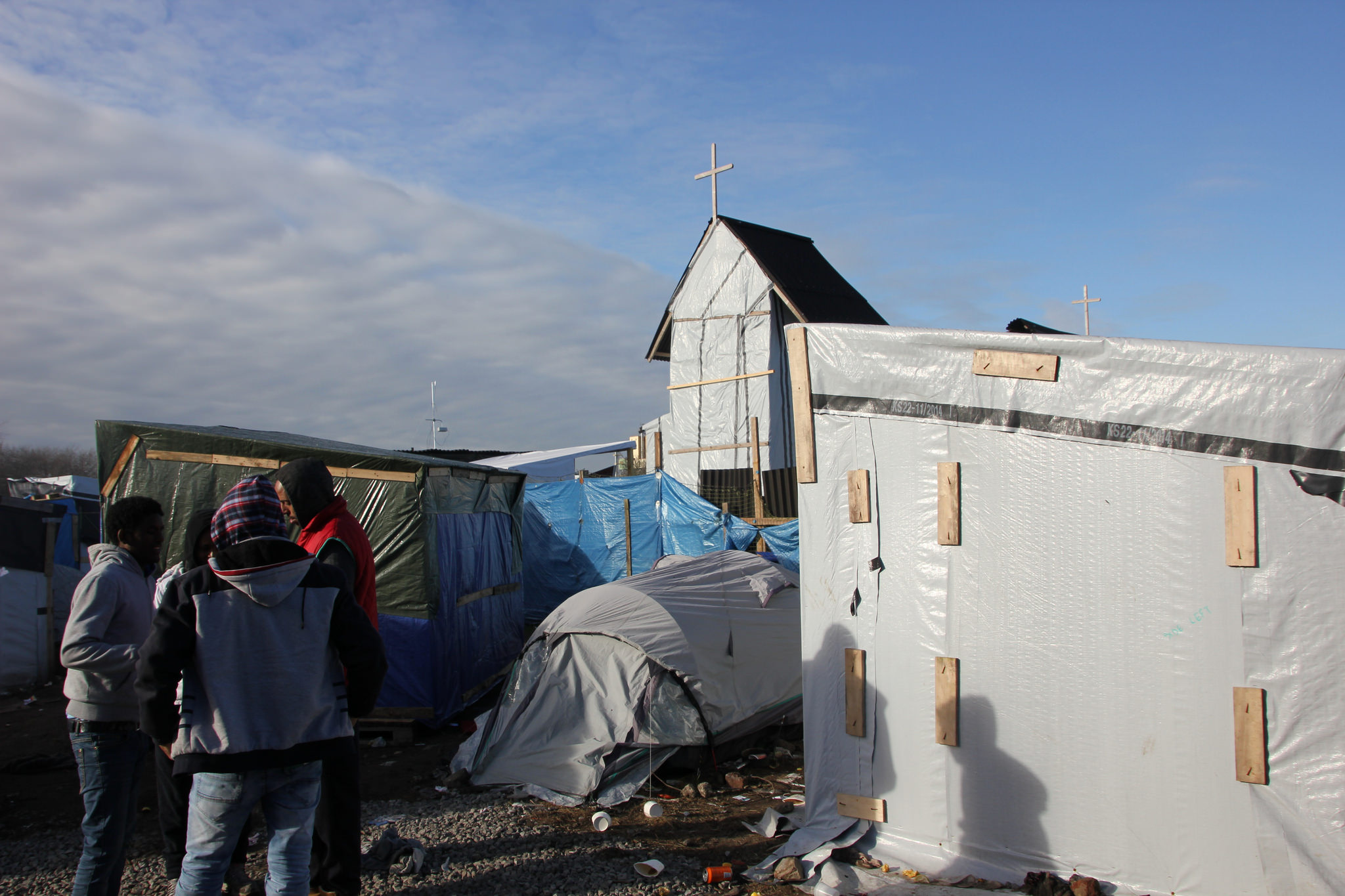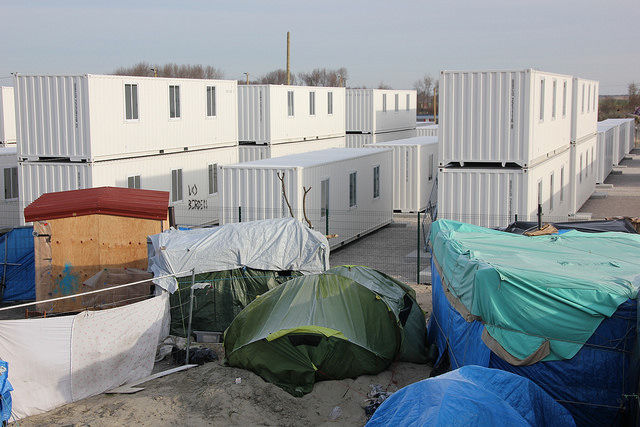Photo: malachybrowne
Welcome to “the Jungle”: seeing beyond the chaos in Calais
- September 8, 2016
Borders & Beyond
Practices of mutual aid and collective solidarity have been at the heart of the Calais migrant camp, which is now threatened with destruction by the French state.
- Author
Within hours of arriving in the Calais migrant camp for the first time, we found ourselves cozied-up in the combined bed and dining room caravan of a Kurdish family, sharing dinner and an immense hospitality they had managed to keep with them on their harrowing journey from Iraq.
The space was tight for seven adults and two children — including a one-month-old baby, the camp’s youngest resident. Nonetheless, the atmosphere was warm and welcoming as we broke bread together, communicating through broken snippets of various languages.
This may seem a trite way to begin a story about a camp known for its violence and overcrowding, but over the coming two weeks it was far from the exception. Every day there, acts of kindness, hospitality, courage, solidarity and collective action are found in abundance. As in so many of the countries of origin that the camp’s more than 10,000 residents have left behind, dense networks of people-supporting-people have come to fill the gaps left by the failures of the state.
Over 70 different restaurants and small shops have sprung up around the camp, doing much more than just selling goods. Practically, they help address the needs of the camp that charities are unable or unwilling to meet. That might be through the provision of food, clothes, SIM cards to contact family abroad, or through informal response networks for dealing with police raids.
They serve as community information hubs and between them form a basic communication network through which messages can rapidly spread across the camp. They also provide social spaces, where relationships grow, plans are made, information is shared and, often, people are able to simply relax and watch a Bollywood film with a cup of Chai tea.
The shops are but one example of the ways people have come together to make life in the makeshift village a more liveable experience. However, most of the narratives that make it out of the camp are a mix of terror and tragedy. While some are accurate, many are massively sensationalized by both tabloids tirades looking to stoke fear of “migrant swarms,” and well intentioned, yet still exploitative, “poverty porn” about unaccompanied children, unsanitary facilities, or the painful journeys that led people to Calais.

Photo by malachybrowne
This is not to undermine the realities that underpin these stories; you would be hard-pressed to find residents who deny that violence and fear are daily parts of life in France’s biggest migrant camp. But to tell these stories without some of their less-sensational counterparts does a disservice to all those who have made the encampment so much more than the sum of countless tabloid headlines.
Viewed through a different lens, the Calais camp is a bustling small town with its own economy and a multiculturalism rarely found outside of big cities. Powerful elements of community have taken root there in spite of the inherently-transient population, the complications of widespread post-traumatic stress, and the ongoing violence of the French state. While it is hard to capture the nuance and complexity of what takes place in the course of a single day in the camp, below are a few patterns I noticed in two weeks there. They highlight some of the collective practices that kept things together, amidst a myriad of forces trying to tear them apart.
Sharing of food and resources
We are often told that necessity fuels competition. This is one of capitalism’s foundational myths. In practice, though, the opposite often occurs: in moments of need we establish new kinds of cooperation and mutuality.
During two weeks in Calais, I spent very little money on food and drink. When I did, it was inexpensive and often for at least half-a-dozen people. Every day, someone would invite you in for a cup of tea and a chat, if not a meal. The big charity kitchens certainly provided a significant part of the food mix, but they would be the first to acknowledge that they can only meet a fraction of the demand they face each day. In helping to fill this crucial gap, the restaurants — run as businesses, but businesses grounded in their own communities — often provide free food to those who are unable to pay or have missed-out in long queues for the charity kitchens.
And the sharing isn’t just limited to food. It also applies to tools, blankets, tents and shelters. Those who are without money can often get free showers from the camp’s barber shops. If someone’s tent mate succeeds in making the journey to England, they will often invite others into the newly-freed space. If someone has a shovel or a rake, it is unquestioningly passed along to someone who is working on the foundations of a new shelter.
Capitalism is premised on the Social Darwinist idea that we grow and evolve through competition, yet the Calais camp tells a very different story. In a place where survival cannot be taken for granted, it is primarily through mutual aid, sharing and cooperation that life has been made possible for a constantly-fluctuating population of nearly ten thousand.
Collective building, collective welcoming
Similarly, sharing and cooperation in the camp are not just questions of food and physical resources. I spent a week building an extension to a community space in the middle of the camp, in which demand had clearly outstripped the facilities available.
There has been a state-imposed building ban in play since the destruction of the south side of the camp by French police in March, meaning materials are often difficult to come by and require informal support to be found. The building project was mostly focused over a few days, but during that time garnered the support of dozens of relative strangers.
Sometimes this meant help with tools or sourcing building materials, but often involved the input of more experienced builders, offering tips on foundations, windows, or insulation, or actively drilling holes, scavenging scrap wood, or sawing vertical beams down to size. There was never any discussion of compensation, but an unspoken understanding that the efforts would be returned through the karma of the camp. In this spirit, I happily responded to others’ requests for an extra set of hands on their shop or shelter. It was clearly the way things were done there.
According to the latest figures from not-for-profit associations operating in Calais, an average of 70 new migrants arrive in the camp each day. This is vastly more than succeed in making the journey to Britain each night, or who decide to self-deport or search for another European country to settle in, so this growing population can prove incredibly challenging in the shrinking space the French state has chosen to allocate for the camp. Yet many of these challenges are circumvented through welcoming processes facilitated by the communities that have established themselves there.
A new Sudanese family has arrived? Who knows someone in the Sudanese community to help them get a place to sleep and some food?

Photo by malachybrowne
A Pashto-speaking Afghani is wandering around looking a bit lost? Who speaks Pashto? Can we help them find someone they know here?
A child from Syria has arrived and is looking for their uncle. Is there a tent or shelter of other Arabic-speakers who can take them in until they find him?
While some of the charities take on aspects of this role, it is hard to imagine the Calais camp functioning without this improvised system of collective integration. Given the journeys of violence and trauma that so many new residents are coming from, without a warm welcome and some initial help with basic necessities, the levels of conflict would likely be much higher. The relative absence of this kind of process in places where new migrants often find themselves (whether through chance, or after being housed by the state in remote towns), can make settlement a turbulent time. The informal systems of the camp have gone some way to addressing this turbulence.
Crack-down on community
The French state appears to recognize the significance of these collective processes and structures in maintaining the camp. As a result, the restaurants and small businesses have been particularly targeted by police raids under the pretext that not enough taxes are being paid, or that their health and safety standards are not up to scratch. Even after a court ruling in mid-August said that the shops and restaurants of the camp could not be destroyed, police continue to make raids, confiscating food, though with less violence than they had before the ruling.
For many, the attacks on restaurants seem aimed at breaking the communication networks and community organizing spaces at the heart of the camp. Without these, a whole series of domino effects would likely fall in suit, starting with very immediate food shortages, and extending to less preparation and response when police decide to make arbitrary raids.

Photo by malachybrowne
Perhaps more insidiously, the French government funds an “official” container camp within the broader encampment, in which none of the more informal aspects of community are able to exist. Run by charity La Vie Active, the fenced-in white cargo containers look like a sterile suburb, compared to the camp’s urban grit, but are described by residents as “prison-like,” forcing migrants to submit their fingerprints if they want to live there, seriously undermining their potential to claim asylum elsewhere in Europe. The container camp is also staffed by private security, constantly monitored by CCTV (another threat to asylum claims), off-limits to visitors and provides shelter to police awaiting vehicle pick-ups, in spite of ongoing police violence against residents. Needless to say, there are no restaurants in the container camp: only charity kitchens.
The containers provide a bland image of relative-cleanliness for French authorities to put on display for the media, while instilling a deeply-clientelistic model of charity dependency, making it practically impossible for people to organize their own solutions to the daily problems they face. Many in the camp feel that this is exactly what they were designed to do — to break the bonds of solidarity that currently give the wider camp a life and autonomy of its own, challenging the state’s monopoly on power. But tellingly, most have not risen to the bait, choosing to stay in the main camp, in spite of all its challenges.
The many truths of the so-called “Jungle”
The truth of the camp is not singular. The violence, the over-crowding and the inter-community tensions are very real and persistent crises. The Calais camp is very male-dominated, which then becomes less-safe for women to inhabit. The “mafias” which control most of the pathways to the UK are not afraid to use deadly force to maintain their routes. These are not realities to be glossed over.
Yet the so-called “Jungle” is also a reminder of the human capacities for kindness, cooperation and self-organization, so often lost in spaces more beholden to the dictates of the state. The Calais camp feels in many way like countless towns and cities in the Global South, dropped awkwardly on France’s industrial coastline. Its dirt roads and makeshift structures create the aesthetic, but it’s the informality, DIY culture, barter economy and daily acts of solidarity from neighbors and strangers alike, which allow you to forget for a moment that you are in the belly of Fortress Europe.
By acknowledging the importance of what people have been able to create within the camp, whatever happens to it, we open the possibilities that some of its lessons will have the chance to grow and germinate elsewhere, as the current crises deepen and spread across Europe and beyond.
In an ideal world, there would be no need for the Calais camp to exist, but until we find ourselves there, it feels important to draw whatever lessons we can about what can make spaces like it better for those who are living and experiencing them on their journeys.
Source URL — https://roarmag.org/essays/jungle-calais-self-organization/


